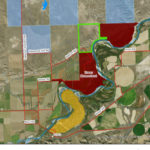Violence and mass shootings tend to increase during the summer months, particularly around the Fourth of July, which has historically been one of the deadliest days of the year.
A series of shootings during last year’s holiday left more than a dozen people dead and over 60 injured. Two years ago, a mass shooting at a Fourth of July parade near Chicago resulted in the deaths of seven people. The mother of a 10-year-old boy paralyzed in the attack stated that her family will not be attending this year’s parade, which is returning for the first time since the shooting.
“I don’t know if we’ll ever be able to attend the parade again,” said Keely Roberts, who was also injured.
The Gun Violence Archive, which tracks mass shootings involving four or more people, regardless of fatalities, shows that June, July, and August have had the highest number of mass shootings over the past decade. The lowest numbers were recorded from December through March.
Independence Day leads the list with 58 mass shootings in the last 10 years, closely followed by July 5, according to the archive.
“It’s the gatherings, the free time, the drinking,” said James Alan Fox, a criminologist and professor at Northeastern University, who oversees a mass killings database run by The Associated Press and USA Today in collaboration with the university.
In the first half of this year, there were 19 mass killings, 14 of which were shootings resulting in at least four deaths in the United States, according to the database. In 2023, the country saw the highest number of mass shootings – 39 – since tracking began.
Researchers attribute the increase in violence and shootings during the summer months to a combination of factors.
School’s out for the summer
Mass killings are more likely to occur in homes, with victims often being related to the shooter or close acquaintances.
When school is out, families spend more time together, children are at home all day, and there is a higher chance of more victims when everyone is under the same roof, explained Jesenia Pizarro, a criminology professor at Arizona State University.
Teenagers also have more free time during the summer, creating more opportunities for violence, she added.
After two mass shootings in Dayton, Ohio, resulted in three deaths and eight injuries in late June, police mentioned that one of the shootings took place at a vacant house where hundreds of teens and young adults had gathered.
“It could have been much worse,” said Eric Henderson, the city’s assistant chief, pointing out that it was the third large party since mid-June that led to trouble after young people occupied a vacant house.
More social events, more drinking
Family reunions, block parties, and summer festivals bring more people together, creating more opportunities for trouble, especially when alcohol is involved.
“These kinds of things exist all year round, but they are more prominent in the summer,” said University of Miami criminologist Alex Piquero. “We know that violence tends to increase in the summer. So, I expect it to happen this summer and in the following years.”
The chances of being a victim of a mass shooting are still low, but the potential for more victims increases when an incident occurs in a crowded event.
During the first weekend of this summer, there were several shootings at large gatherings resulting in multiple fatalities or injuries, including in Montgomery, Alabama, where gunfire erupted during an unsanctioned street party with over 1,000 attendees. Nine people were shot, and police found over 350 spent shell casings.
Tempers rise with hot temps
Various studies have linked warm weather and high temperatures to increased irritability, as well as a rise in violent crimes, although other factors are often at play.
Jillian Snider, a former New York City police officer and current lecturer at John Jay College of Criminal Justice, witnessed this firsthand in neighborhoods where lack of air conditioning forced people outside on sweltering days.
“It can make people irritable because there’s no relief from the heat, and tensions escalate,” she said. “There’s no escape, you’re just constantly uncomfortable.”
Contributions by Associated Press journalists Sharon Johnson in Atlanta and Sophia Tareen in Chicago.
Copyright 2024 The Associated Press. All rights reserved. This material may not be published, broadcast, rewritten, or redistributed without permission.





